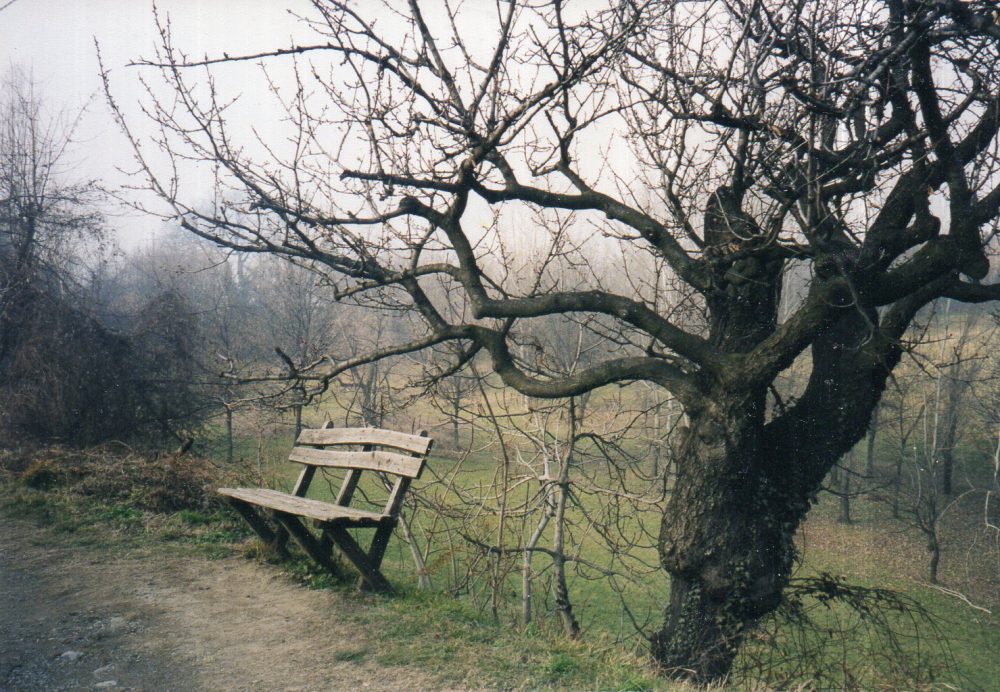 When I was a young wife in the fifties, my father helped us buy a house in the small town where I had grown up. Just outside my kitchen door was a garbage pail sunk into the ground. I would step on the lid, dump in my orange peels, potato peelings, stale food, etc. and once a week a man would come by with a big truck, pull out the bucket, empty it into his truck, and along with all the other garbage he had collected, take it to feed his pigs.
When I was a young wife in the fifties, my father helped us buy a house in the small town where I had grown up. Just outside my kitchen door was a garbage pail sunk into the ground. I would step on the lid, dump in my orange peels, potato peelings, stale food, etc. and once a week a man would come by with a big truck, pull out the bucket, empty it into his truck, and along with all the other garbage he had collected, take it to feed his pigs.
His piggery was deep in a wooded area and the smell bothered no one because it was quite isolated. I expect that today his pig farm would have been deemed unsanitary and done away with. Then it fitted in with a more appropriate attitude of the time of waste not want not. It made a good thrifty use for what otherwise would go to waste. In those days there was a more sensible attitude toward what we have and what we need, or so it seems to me. The Covid 19 crisis seems to have exacerbated a prevailing need to have more and more.
Not long ago people were treating toilet paper as if it were about to vanish from the earth. One person even spotted a woman loading her SUV with an entire tray of rolls from a Walmart. Other items vanished from shelves as people reacted out of fear of lack. How much I need is one amount. That need springs from a logical, rational approach to having. How much I want may stem from a fear of loss, a desire to own more than I already have, plain greed, or envy driven by a competitive nature.
Need and want are such different conditions. Operating from an awareness of need is different than operating from a feeling of want. I once read a story told by someone waiting in an airport who overheard a mother and daughter saying goodbye to one another. As they embraced, she overheard one say to the other, “I wish you enough.” The other replied with the same words. At first it seemed a curious thing to say for a farewell. As I reflected, I realized that to have enough is actually an absolutely perfect condition in which to be.
When I have enough, I have the space to put it. When I have more than enough, whether food needing refrigeration or clothing to find room for in our shared closet, I have to become creative about fitting whatever it is in. I may end up shoving things to the back of the refrigerator and losing sight of them, or into the back of the closet and doing the same. Then what I have lost sight of may become either moldy or essentially useless. It is said that much food goes to waste in this country, and no doubt leftovers may be a large part of that food.
Raised in a New England family by a thrifty German mother, I try to be very mindful not only about my leftovers but also my wardrobe. My beloved, however was raised by a mother who enjoyed abundance and showered it on her family. Sometimes we experience minor conflict around our divergent opinions. As the days go by, my refrigerator goes from full to empty and back again. Our closet, too has its moments. What matters to me is that we work out what constitutes enough for each of us, and that we make peace with our different opinions.
Comments? Questions? Suggestions? Write me at tashahal@gmail.com


 My brother and his wife just moved to Illinois, leaving behind the home we both grew up in on the North Shore In the next town, there is a square dedicated to our grandfather who died in World War One. Every year the parade stops in the street by the square. His name is on a pole in front of the fire station there, and they put a wreath on it each year in his memory. When I was a child my grandmother used to bring a big bunch of carnations to place inside the wreath. In later years my brother always attended the ceremony and participated. Now he will no longer be able to do so. Still he will have many years of memories, dating back to his boyhood.
My brother and his wife just moved to Illinois, leaving behind the home we both grew up in on the North Shore In the next town, there is a square dedicated to our grandfather who died in World War One. Every year the parade stops in the street by the square. His name is on a pole in front of the fire station there, and they put a wreath on it each year in his memory. When I was a child my grandmother used to bring a big bunch of carnations to place inside the wreath. In later years my brother always attended the ceremony and participated. Now he will no longer be able to do so. Still he will have many years of memories, dating back to his boyhood. I’ve never been a competitive person. Usually a sense of competition kicks in around the age of four, when a child gains a clear understanding of “me” and “mine.” Even then there is often a desire to share unless the child is surrounded by competitors. When I was growing up competition was the rule and the idea of a game that required cooperation instead was unknown. I did not enjoy the competitive world I grew up in.
I’ve never been a competitive person. Usually a sense of competition kicks in around the age of four, when a child gains a clear understanding of “me” and “mine.” Even then there is often a desire to share unless the child is surrounded by competitors. When I was growing up competition was the rule and the idea of a game that required cooperation instead was unknown. I did not enjoy the competitive world I grew up in. My parents frequently discussed decisions, disagreed often and usually did so at the tops of their voices. They were a fiery couple and yelled their feelings vociferously. We did not have any neighbors nearby and no one could hear them but me. Though there was never any physical violence between them, I do remember the day my mother hurled a plate of scrambled eggs at my father. He ducked and it sailed into the closed window behind him, breaking through it, to land and shatter on the stone terrace beneath, breaking through the wood.
My parents frequently discussed decisions, disagreed often and usually did so at the tops of their voices. They were a fiery couple and yelled their feelings vociferously. We did not have any neighbors nearby and no one could hear them but me. Though there was never any physical violence between them, I do remember the day my mother hurled a plate of scrambled eggs at my father. He ducked and it sailed into the closed window behind him, breaking through it, to land and shatter on the stone terrace beneath, breaking through the wood. The single metal hour hand lay on the table in front of me. Stephen and I had been playing with an old clock in an effort to get it to work. However, once the hands become loosened from the mechanism that counts off the minutes, even if it still ticks, the clock is effectively broken. We took the clock apart and kept the face to use for an art project. Gazing at the pointed hour hand I wished I could think of a way to put it to use. Finally I gave it to Stephen, thinking he might be able to make use of it in a collage.
The single metal hour hand lay on the table in front of me. Stephen and I had been playing with an old clock in an effort to get it to work. However, once the hands become loosened from the mechanism that counts off the minutes, even if it still ticks, the clock is effectively broken. We took the clock apart and kept the face to use for an art project. Gazing at the pointed hour hand I wished I could think of a way to put it to use. Finally I gave it to Stephen, thinking he might be able to make use of it in a collage. There is a wonderful song by the Kingston Trio from the 60’s I believe, about lemons. It contains a real truth concerning them: they must be sweetened to taste good. The chorus goes: “Lemon tree very pretty, and the lemon flower is sweet, but the fruit of the lemon is impossible to eat. Very true, and it is also true that lemons can do all sorts of things besides make good recipes..
There is a wonderful song by the Kingston Trio from the 60’s I believe, about lemons. It contains a real truth concerning them: they must be sweetened to taste good. The chorus goes: “Lemon tree very pretty, and the lemon flower is sweet, but the fruit of the lemon is impossible to eat. Very true, and it is also true that lemons can do all sorts of things besides make good recipes..
 There is a joke I remember hearing some time ago to the effect that when a minister repeatedly prayed to God for patience, God sent him an incompetent secretary. He ought to have known better. Patience training is best experienced when I am in situations requiring patience. How else can I learn? There is no other way I know of.
There is a joke I remember hearing some time ago to the effect that when a minister repeatedly prayed to God for patience, God sent him an incompetent secretary. He ought to have known better. Patience training is best experienced when I am in situations requiring patience. How else can I learn? There is no other way I know of. When I was little my grandmother used to take me with her to visit her friends. Among them were two sisters who had never married but lived together in a pretty home with a nice porch. They used to give me cookies and cambric tea–milk, sugar and a wisp of tea in a delicate china cup. My own mother was physically strong and after my father passed on lived alone and drove herself between Florida and Maine even in her eighties.
When I was little my grandmother used to take me with her to visit her friends. Among them were two sisters who had never married but lived together in a pretty home with a nice porch. They used to give me cookies and cambric tea–milk, sugar and a wisp of tea in a delicate china cup. My own mother was physically strong and after my father passed on lived alone and drove herself between Florida and Maine even in her eighties.